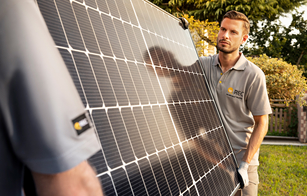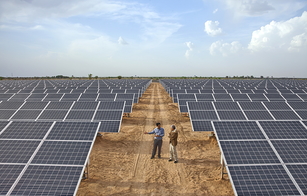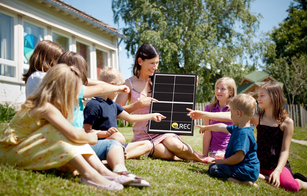Solar panel recycling

Creating clean and green energy through solar panels would only be half as successful if the panels could not be disposed of properly at the end of their life. REC makes a concerted effort to ensure its products are durable and recyclable. Learn more about REC solar panel recycling here.
Low carbon footprint
Thanks to REC's rigorous efforts, REC panels have a low carbon footprint, as evaluated in 2016 by Deloitte SA in Singapore and critically reviewed by 2.-0 LCA Consultants in Denmark. Read our whitepaper to find out how REC achieves a class-leading carbon footprint. In addition, panels made with REC's award-winning TwinPeak technologies have been certified by CERTISOLIS for their low carbon footprint, qualifying them for French tender. Learn more about the CERTISOLIS certification here.
Quick energy payback time
Because because of this low carbon footprint and the advanced production methods used, REC solar panels have a short energy payback time (EPBT). Of course, the exact energy payback time depends on the irridiation at the site of the installation.
For example, when factoring the total production of a solar panel, packaging, transport to the installation site, and transport to the recycling site in Germany after 25 years of operation, we expect an energy payback time of around two years for an installation in Marseille, France. In other words, after just two years, our panels will have generated the same amount of energy required to produce them. After that, it's energy profit. To gain a better understanding of EPBT, including a summary of recent reports on how REC amortizes its energy debts, read our insightful whitepaper.
COP21: REC and the fight against climate change
As a key part of its COP21 initiative, REC has issued “A Call for A Sunny Commitment,” an open letter addressed to governments, organizations and other stakeholders, outlining how clean, viable and cost competitive solar energy is today, and what policy action is needed from governments to eliminate barriers for solar’s growth in the interest of a safe climate. REC conducted a market study on climate change and how going solar can help close the COP21 gaps. The study includes results for: Global, U.S. Germany, The Netherlands, Belgium, and Japan. Click here for the study.
Governing sustainability
At REC, we take sustainability seriously and have policies in place to ensure we do our part for the good of the environment, just as you do by going solar.
- REC policies on sustainability (PDF)
- HSE management
- Certifications of the REC production facility in Singapore:






